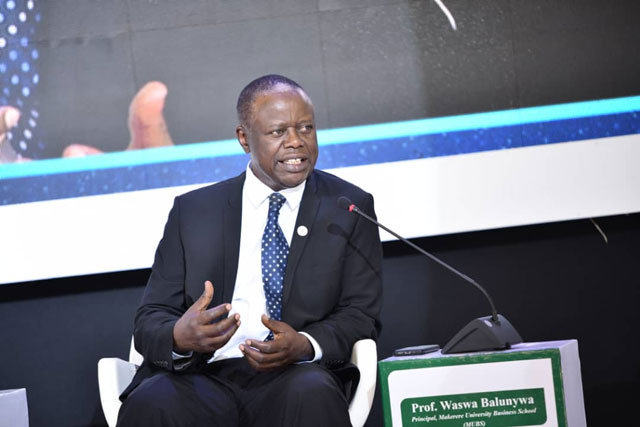
Kampala, Uganda | THE INDEPENDENT | Professor Waswa Balunywa, the Principal Makerere University Business School, has stung Makerere university management on their failure to make the praised university impactful in the community despite the enormous resources at hand.
Prof Balunywa made the remarks Thursday afternoon during a stakeholders mobilization event which is the first of the many other activities lined up in commemoration of Makerere’s centennial milestone as a beacon of higher education in the region.
According to Balunywa, if there was any other university in Uganda with resources that are available to Makerere, the oldest institution in the country would now be overshadowed thus challenging its management to look at ways of ensuring that the existence of the great institution is felt in the communities.
Balunywa’s who was discussing a theme; ‘leveraging 100 years of Excellence in Building a Transformed Society,’ was met with mixed reactions from participants and university management officials.
Dorothy Kisaka, KCCA executive director who was one of the panelists at the event supported Prof Bulunywa’s argument noting that after 100 years of existence, Makerere is still changed on it outputting both in terms of problem-solving research and student who can compete in the employment market.
On defensive, Yusuf Kiranda, University Secretary noted that Makerere might have made several impactful works in several fields but most of these have remained unacknowledged due to bad press and misinformation.
With professor Balunywa’s argument on ensuring that Makerere is felt in the communities, Lonah Magara, the University Council Chairperson, says that the university management is aware of this challenge and has laid strategies to make this achievement.
Magara accepts that besides merrymaking on the rich history of the institution, there are great prospects for Makerere and its shareholders to renew their commitment to making the university more impactful in the years to come so that members of different committees and our societies feel Makerere in their lives.
“”Besides reviewing our history, the year-long celebration presents great prospects for Makerere and her stakeholders to renew their commitment to make the University more impactful in its activities in the years to come” Magara said.
Professor Barnabas Nawangwe, the University Vice-Chancellor, also accepted that there is a need for Makerere University to leverage the success it has achieved throughout the past 100 years to solve new social problems. Prof Nawangwe however notes that all this needs to be properly planned.
Thomas Tayebwa, Government Chief Whip who represented Speaker of Parliament Jacob Oulanya as chief guest commended Makerere for its contribution towards higher education over years. He, however, raised several issues noting that they need to be urgently addressed for the betterment of the institution as it looks on to the 100 years.
Tayebwa highlighted that although the government is pumping huge sums of money into the university, more so in human resources there has been little or no value for money as many well-paid lectures end up moonlight and fail to give the institution enough attention thus poor outputs.
Tayebwa further advised that with all the aspirations and after the long years of experience and existence, it’s high time that Makerere University thought of becoming a self-sustaining institution and stop begging for a handout from donors and the government.
The government chief whip, however, noted that there is a need for the government to amend the universities and other tertiary institutions act and review policy on higher education in Uganda to enable institutions such as Makerere to tap into their potential.
Next Makerere university will be marking 100 years of existence. The institution, which is the oldest of its kind in the region, traces it beginning in 1922 when it was opened as a technical institution by the colonial government.
According to the organizing committee, Makerere will have a yearlong celebration of their existence and excellence at the helm of higher education in the country and the region.
****
URN
 The Independent Uganda: You get the Truth we Pay the Price
The Independent Uganda: You get the Truth we Pay the Price



